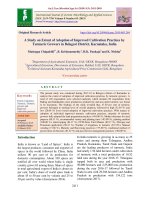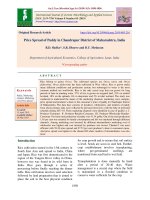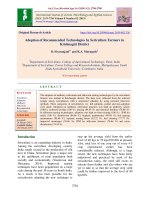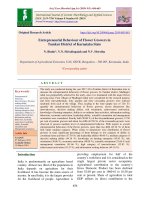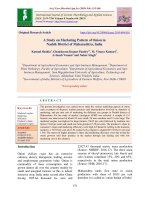Constraints faced by rice growers in adoption of recommended rice cultivation practices in Palghar district of Maharashtra, India
Bạn đang xem bản rút gọn của tài liệu. Xem và tải ngay bản đầy đủ của tài liệu tại đây (106.2 KB, 4 trang )
Int.J.Curr.Microbiol.App.Sci (2019) 8(10): 682-685
International Journal of Current Microbiology and Applied Sciences
ISSN: 2319-7706 Volume 8 Number 10 (2019)
Journal homepage:
Short Communications
/>
Constraints Faced by Rice Growers in Adoption of Recommended Rice
Cultivation Practices in Palghar District of Maharashtra, India
R. S. Karangami*, S. A. Dhenge, S. V. Yadav and P. G. Mehta
Department of Extension Education, PGI, MPKV, Rahuri (M.S.), India
*Corresponding author
ABSTRACT
Keywords
Constraints,
Adoption,
Recommendation,
Rice growers
Article Info
Accepted:
07 September 2019
Available Online:
10 October 2019
The present study was conducted in Palghar district of Maharashtra state. Palghar
district two tahsils namely Wada and Palghar selected purposively for this study on
the basis of maximum area under cultivation of rice crop. From each selected tahsil of
the district six villages selected for this study on the basis of maximum area under
cultivation of rice crop. Total 12 villages were selected. From each selected village 10
respondents selected for the present study by random sampling method. Thus, the total
120 respondents was the sample for this study. The respondents were interviewed with
the help of a specially designed schedule. The ex-post facto research design was used
for the present study. The analysis of data revealed that majority of the respondents
were ‘middle’ age, had ‘secondary’ education, ‘marginal’ area under rice cultivation,
India is facing the challenges of food and fodder production to meet the demand of
rising human and cattle population. In India, rice is the promising crop to acquire self
sufficiency of food grain production for the population. The area, production and
productivity of rice crop in Palghar district was 14980 ha., 36641 qtls, 2446 kg / ha.
respectively, in the year 2014. The major constraints faced by farmers in adoption of
selected agricultural technologies of rice crop were shortage of labourers,
unavailability of fertilizer at proper time and lower market price of produce,
respectively.
Introduction
A major need to the developing countries is to
raise the standard of living of the people in
general and rural in specific. In India, where
agriculture occupies a dominant position in the
economy of country, economic growth and
progress actually depends to a large extent on
the improvement of agricultural technology
and adoption of agricultural innovations by the
farmers. Therefore, it is necessary to change
the attitude of the farmers so that they may
shift from traditional to modern methods of
farming. Rice (Oryza sativa L.) is one of the
most important cereal grains in the world
today and serves as a staple food source for
more than half of the world’s population
(Source.www.thecropsite.com), particularly in
India, China and a number of other countries
in Africa and Asia. India is facing the
challenges of food and fodder production to
meet the demand of rising human and cattle
population. One of the major causes of this
682
Int.J.Curr.Microbiol.App.Sci (2019) 8(10): 682-685
problem is low level of adoption of improved
agricultural practices by the farmers.
Materials and Methods
There are three seasons for growing rice in
India viz. autumn, winter and summer. The
main rice growing season in the country is
‘kharif’. It is known as winter rice as per the
harvesting time. The sowing time of kharif
rice is June – July and it is harvested in
September - October. India is an important
centre of rice cultivation. The rice is cultivated
on the largest areas in India. The world rice
cultivated on the area of 221.61 million
hectares with production of 728.07million
metric tons in the year 2013-2014. Thus, rice
production; consumption and trade are
concentrated in Asia. More than 90 per cent of
global production is occurring in tropical and
semi-tropical Asia.
From Palghar district two tahsils namely
Wada and Palghar selected purposively for
this study on the basis of maximum area under
cultivation of rice crop. From each selected
tahsil of the district six villages selected for
this study on the basis of maximum area under
cultivation of rice crop. Total 12 villages were
selected. From each selected village 10
respondents selected for the present study by
random sampling method. Thus, the total 120
respondents was the sample for this study. The
data collected was processed, quantified,
categorized and tabulated. The established
parameters like mean, frequency, percentage,
standard deviation and Chi square test were
calculated.
In India, rice is the promising crop to acquire
self sufficiency of food grain production for
the population. Rice crop occupy the largest
cultivated land in the country. It was
cultivated on the area of 43.95 million
hectares with production of 106.54 million
tons in the year 2013-2014. Maharashtra rice
is grown on area of about 1.56 million
hectares with a production of about 2.95
million tons. (www.irri.org)
Results and Discussion
In Maharashtra State, rice is the main crop
grown in the costal districts of the Konkan
region mainly in the five districts namely
Thane, Raigad, Ratnagiri, Sindhudurg and
Palghar districts. The package of practices of
rice cultivation is being recommended by
DBSKKV, Dapoli since 1972. In Konkan
region the area is about 0.44 million hectares
with a production of about 15.10 lakh tons in
the year 2013-2014 (Source: Directorate of
Economics and Statistics, Department of
Agriculture and cooperation, GOI 2013-2014).
The area, production and productivity of rice
crop in Palghar district was 14980 ha., 36641
qtls, 2446 kg / ha. respectively, in the year
2014.
An attempt was made in the present
investigation to understand the constraints
experienced by the farmers in adoption of
selected
agricultural
technology.
The
constraints reported by the respondents are
presented in table 1.
The present study have seen constraints faced
by farmers in rice cultivation were shortage of
labour (80.00 per cent), unavailability of
fertilizer at proper time (75.00 per cent),
inadequate irrigation facility (48.34 per cent),
lower market price of produce (70.83 per
cent), high cost of inputs (69.17 per cent),
high cost of machineries (68.34 per cent), lack
of knowledge for making appropriate
concentration of insecticide / fungicide for use
(65.00 per cent), non availability of quality
seeds (61.67 per cent), high cost of pesticide
and fungicides (60.08 per cent), unavailability
of weedicide at village (52.5 per cent), non
availability of compost (46.67 per cent), and
unavailability of seeds in time (39.17 per
cent), could not identified pest and disease
(37.50) (Table 1).
683
Int.J.Curr.Microbiol.App.Sci (2019) 8(10): 682-685
Table.1 Constraints of adoption of rice cultivation practices by farmers
Sl.
No
1.
2.
3.
4.
5.
6.
7.
8.
9.
10.
11.
12.
13.
14.
Constraints
Shortage of labour
Unavailability of fertilizer at proper time
Unavailability of seeds in desired quantity.
Inadequate irrigation facility
Lower market price of produce
High cost of inputs
High cost of machineries
Lack of knowledge for making appropriate
concentration of insecticide / fungicide for use.
Non availability of quality seeds
High cost of pesticide and fungicides
Unavailability of weedicide at village
Non availability of compost
Unavailability of seeds in time
Could not identified pest and disease
The efforts for the development of the farmer
need an integrated approach. The farmer
living in rural areas directly or indirectly
depend upon agriculture as a source of
livelihood. The rice grower cultivators in the
Konkan region own marginal and small land
holdings and grow rice crop which is not
much remunerative. The study has
categorically pointed out that high cost and
unavailability of agriculture inputs in time
were the most severe constraints experienced
by the farmers in adoption of those practices
which were of situational in nature. Thus, they
may be motivated to adopt modern technology
for forming groups, co-operatives. Farm
scientist, extension organizations and input
supply agencies may adopt suitable policies
and programmes to overcome such conditions.
Acknowledgement
The authors thankful to the Department of
Extension Education, College of Agriculture,
Dr. Balasaheb Sawant Konkan Krishi
Respondents (N=120)
Frequency
Percentage
96
80.00
90
75.00
87
72.50
58
48.34
85
70.83
83
69.17
82
68.34
78
65.00
74
73
63
56
47
45
61.67
60.08
52.5
46.67
39.17
37.50
Vidyapeeth, Dapoli, Ratnagiri, Maharashtra
for providing all the inputs and facilities to
carry out this study.
References
Bhosale, U.S. (2010). Participation of rural
youth in paddy farming in Anand
district of Gujarat state. M. Sc. (Agri.)
Thesis, AAU, Anand (Gujarat).
(Unpublished).
Dhenge, S.A. (2013) Knowledge and adoption
of integrated pest management
practices by paddy growers M. Sc.
(Agri.)
Thesis,
Dr.
Panjabrao
Deshmukh Krishi Vidyapeeth, Akola.
(M.S.).
More, S. V. (2011). Factors influencing
adoption of hybrid rice cultivation
technology in Ratnagiri district. M.Sc.
(Agri.) Thesis, Dr. Balasaheb Sawant
Konkan Krishi Vidyapeeth, Dapoli
(M.S.).
Pawar P. B. (2009). A study on Inter-Gender
684
Int.J.Curr.Microbiol.App.Sci (2019) 8(10): 682-685
involvement in paddy and sugarcane
crops Cultivation in Navsari Districts
of Gujarat state, M.Sc. (Agri.) Thesis
N.A.U., Navsari.
Telange Prajakta, (2015). Extent of adoption
and causes of non-adoption of rice
varieties developed by DBSKKV,
Dapoli. M.Sc. (Agri.), Thesis, Dr.
Balasaheb Sawant Konkan Krishi
Vidyapeeth, Dapoli (M.S.).
Thakur, V. V. (2011). Influence of social
values
on
adoption
of
the
recommended
rice
cultivation
practices. M.Sc. (Agri.) Thesis, Dr.
Balasaheb Sawant Konkan Krishi
Vidyapeeth, Dapoli (M.S.).
Wadekar, R.P. (2013). Adoption of rice
cultivation practices by Warli tribal
farmers from Thane district of
Maharashtra. M.Sc. (Agri.) Thesis, Dr.
Balasaheb Sawant Konkan Krishi
Vidyapeeth, Dapoli (M.S.).
www.agristat.com.
www.irri.org
How to cite this article:
Karangami, R. S., S. A. Dhenge, S. V. Yadav and Mehta, P. G. 2019. Constraints Faced by
Rice Growers in Adoption of Recommended Rice Cultivation Practices in Palghar District of
Maharashtra, India. Int.J.Curr.Microbiol.App.Sci. 8(10): 682-685.
doi: />
685
